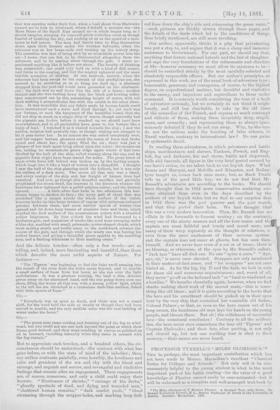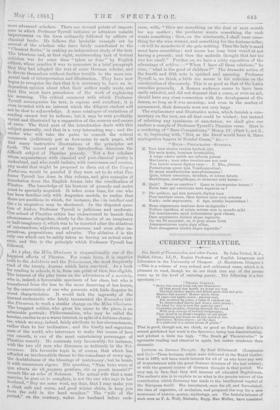- PROFESSOR TYRRELL'S "MILES GLORIOSUS."* THIS is, perhaps, the most
important contribution which has yet been made to Messrs. Macmillan's excellent " Classical Series for Colleges and Schools." Not only will it be con- summately helpful to the young student in what is the most important part of his Latin reading—for the value of a good knowledge of Plautus cannot easily be over-estimated..---but it will be welcomed as a complete and well-arranged. text-book by-
* rho Miles Moriorot of T. Macciaa Manful.. A Random Text, will, Note,, By Robert Yeiverton Tyrroll, M.A., Regius Professor of Greek in the 1Thiversay of Dublin. Loudon : Macmillan. MI. more advanoed scholars. There are several points of import- ance in which Professor Tyrrell initiates or advances notable improvement on the form ordinarily followed by editors of classical books. He follows the laudable example set by several of the scholars who have lately contributed to the ` Classical Series," in making an independent study of the text. The laborious and, at first sight, uninteresting task of textual criticism was for some time " taken as done" by English editors, whose practice it was to announce in a brief paragraph that they had adopted the text of some German scholar, and to devote themselves without further trouble to the more con- genial task of interpretation and illustration. They have now begun to recognise the fact that it is necessary to have an in- dependent opinion about what their author really wrote, and that this must have precedence of the work of explaining his meaning. The critical comment with which Professor Tyrrell accompanies his text, is copious and excellent; it is even invested with an interest which the diligent student will not be slow to acknowledge. A mere catalogue of variations of reading cannot but be tedious ; but it may be very profitably varied and illustrated by a suggestion of the sources and causes of error. The third part of the introduction deals with this subject generally, and that in a very interesting way ; and the ! reader who will take the pains to consult the critical comments (judiciously put as foot-notes to each page), will find many instructive illustrations of the principles set forth. The second part of the introduction discusses the difficult subject of Plautine prosody. Not a few scholars whose acquaintance with classical and post-classical poetry is undoubted, and who could imitate, with correctness and success, any model that might be proposed to them out of the Corpus Poetarum, would be puzzled if they wore set to do what Pro- fessor Tyrrell has done in this volume, and give examples of translation from the English drama into the versification of Plautus. The knowledge of his licences of prosody and metre must be specially acquired. It takes some time, for one who has been familiar only with Augustan models, to realise that there are positions in which, for instance, the i in intellexi and the e in exoptatum may *be shortened. In the disputed ques- tion of hiatus, Professor Tyrrell is judicious and moderate. One school of Plautine critics has endeavoured to banish this phenomenon altogether, chiefly by the device of an imaginary or half-imaginary d, which was to be inserted after the ablatives of substantives, adjectives, and pronouns, and even after im- peratives, prepositions, and adverbs. The ablative d is the only one which can be safely taken as having an actual exist- ence, and this is the principle which Professor Tyrrell has followed..
As a play, the Miles Glorioeus is unquestionably one of the happiest efforts of Plautus. For comic force, it is superior both to the Aulularia and the Trianifimus, the most frequently mead of the twenty dramas which have survived. As a book for reading in schools, it is, from one point of view, less eligible. The interest of the play turns on the adventures of a meretrix, who is, indeed, a favourable specimen of her class, but who is transferred from the less to the more deserving of her lovers, by the intervention of one who presents with little disguise its worst characteristics. It would task the ingenuity of the learned ecclesiastic who lately transmuted the Bunuckus into the Pincerna, to work a similar change on the Miles Gloriosys. The braggart soldier, who gives his name to the piece, is an admirable portrait; Philocomasium, who may be called the heroine, excites in us a warm interest, in spite of a dubious charac- ter, which we may, indeed, fairly attribute to her circumstances, rather than to her inclination ; and the kindly and sagacious Alan of the world, who intervenes to make the course of love run smooth, is one of the most entertaining personages of Plautine comedy. He contrasts very favourably, for instance, With the two old. men who discourse so tediously in the Tri- nummus. his favourite topic is, of course, that which has afforded an inexhaustible theme to the comedians of every age, the doubtfulness of the blessings of matrimony ; but he treats it with uncommon vigour. His question, "Nam bona uxor, si qua educta, sic sit.usquam gentium, ubi ea possit inueniri P" sounds like an echo of Solomon. The actual wife that a man marries, he goes on to complain, is not the one who says to her husband, " Buy me some wool, my dear, that I may make you a cloak soft and warm, and good winter shirts, to keep you from the cold in the hard weather," The "wife of the period," on the contrary, wakes her husband before cock-
crow, with, " Give me something on the first of next mouth
for my mother ; the poulterer wants something, the cook wants something ; then, on the nineteenth, I shall want some- thing for the wise woman, and something for the fortune-teller, —it will be monstrous if she gets nothing. Then the lady's-maid must have something ; and nurse has long been vexed at not having a present ; and then the midwife thought that her fee was too small." Further on, we have a witty exposition of the advantage of orbital :—" When I have all these relations," he cries, " what is the good of children P" The dramatic action of the fourth and fifth acts is spirited and amusing. Professor Tyrrell is, we think, a little too severe in his criticism on the construction of the comedy. This is as good as that of the Latin comedies generally. A Roman audience seems to have been easily satisfied, and did not demand that a scene, or even an act, should have any close connection with the development of the drama, as long as it was amusing; and even in the matter of
amusement, their demands were not very large.
The explanatory and illustrative notes, which furnish a com- mentary on the text, are all that could be wished ; but instead of selecting any specimens of annotation, we shall give our readers a sample of Professor Tyrrell's Plautine verse. Here is a rendering of " Base Comparisons," Henry IV. (Part I., act sc. 4), beginning with, "But, as the Devil would have it, three misbegotten knaves in Kendal Green," &c.:- " I LOCRA TES— STASI 151 US.
M. Tum tros simitu tunicis herbeis uiri, Dis mein iratis, homines iniestabiles, A tergo ndorti ualide me infestis potunt Machaoris ; nam adeo tenebricosa nox erat Non herclo nosses digitos tuos— 1'. Eho, plenior, Periuriorum quam ipsa Vaniloquentiast, Et mons mendaciorum manufestissume !
Quin, totum omentam, diadem, et totum lutum, Stultiloque, obstupidoque, et sterooroi sebi
liama- M. Quid ? Num es cerritus ? Quao to intemperiae teneut ? Enim tune qui conuincas uera ropertus es I' P. Die quidum, qui non potueris digitos toes
Prae tonebris mese, idem herbea istos cum schema Norio; cede arguments. B. Age, amabo loqueredum!
M. Mono argumenta inuitum dare et.ingratiis
Nollom equidem, Si etiam scirem ease in mundo mill
Tot cruciatnenta spud Aeheruntem quot cluont, Dare argumenta inuitus atque ingratiis. Ita me Di amassint, ut, si prao mane foret Argumentorum copia alga uilior, Dare denegarern inuitis atque ingratiis."







































 Previous page
Previous page